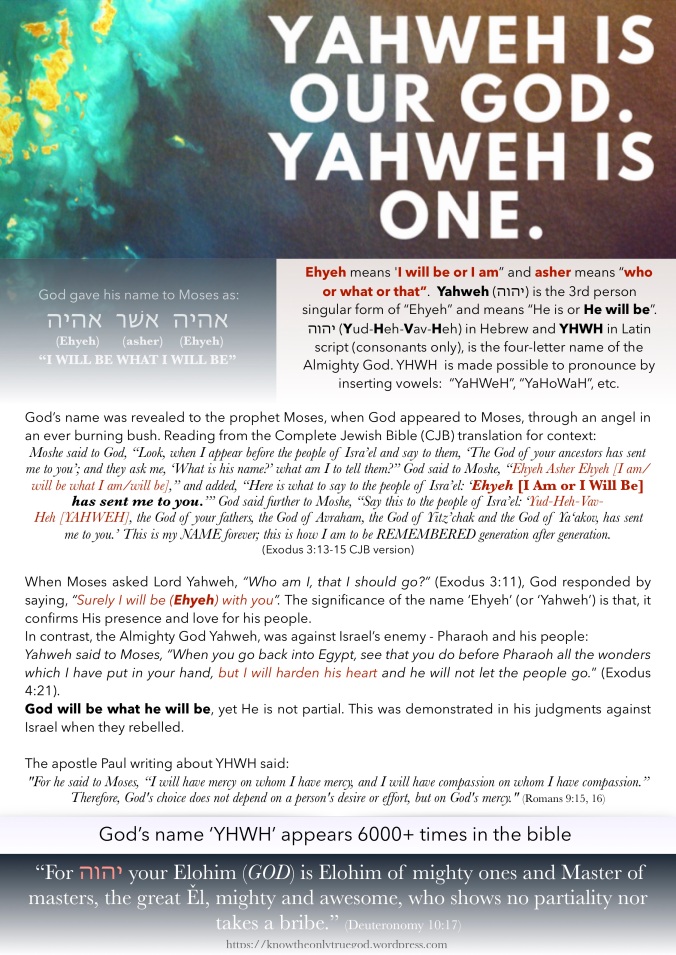Joh 8:51 Verily, verily, I say unto you, If a man keep my saying, he shall never see death.
The Jews obviously objected –Joh 8:52 Then said the Jews unto him, Now we know that thou hast a devil. Abraham is dead, and the prophets; and thou sayest, If a man keep my saying, he shall never taste of death.Joh 8:53 Art thou greater than our father Abraham, which is dead?
Joh 5:25 Verily, verily, I say unto you, The hour is coming, and now is, when the dead shall hear the voice of the Son of God: and they that hear shall live.
Joh 8:44 Ye are of your father the devil, and “ye are not of God.”
Joh 8:48 Then answered the Jews, and said unto him, Say we not well that thou art a Samaritan, and hast a devil?
Joh 8:49 Jesus answered, I have not a devil; but I honour my Father, and ye do dishonour me.
Joh 8:50 And I seek not mine own glory: there is one that seeketh and judgeth.
Joh 8:56 Your father Abraham rejoiced to see my day: and he saw it, and was glad.
Gal 3:16 Now to Abraham and his seed were the promises made. He saith not, And to seeds, as of many; but as of one, And to thy seed, which is Christ.
Joh 8:57 Then said the Jews unto him, Thou art not yet fifty years old, and hast thou seen Abraham?
Joh 8:58 Jesus said unto them, Verily, verily, I say unto you, Before Abraham was, I am he.
- People who keep his words will not die yet Abraham was dead. So He claims to be greater than Abraham
- Now he claims he is even before Abraham, which was not possible because humans do not pre-exist their birth and hence they felt he was exalting himself above their patriarch and considered him worthy of stoning
The Misunderstood Jews:
Joh 8:52 The Jews said unto him, Now we know that thou hast a devil. Abraham is dead, and the prophets; and thou sayest, If a man keep my word, he shall never taste of death.
Analysis
1 Peter 1:20 He was foreknown before the foundation of the world but was made manifest in the last times for the sake of you
Gen 22:18 And in thy seed shall all the nations of the earth be blessed; because thou hast obeyed my voice.
Joh 9:9 Some said, This is he: others said, He is like him: but he said, I AM [he] <— ‘He’ added by translators – Wonder Why?Joh 9:9 Some said, This is he: others said, He is like him: but he said, “I am” <— Is the blind man claiming to be ‘Jehowah’?

“I am THE BEING”
When we look at the ABP or Brenton versions of the OT based Greek Septuagint then we can note the translation for ‘I AM’ appears very differently:
“I will be that I will be”
The ‘Cambridge Bible for Schools and Colleges’ translated the phrase as “ I will be that I will be”
14. I will be that I will be (3rd marg.)] The words are evidently intended as an interpretation of the name Yahweh, the name,—which in form is the third pers. imperf. of a verb (just like Isaac, Jacob, Jephthah), meaning He is wont to be or He will be,—being interpreted, as Jehovah is Himself the speaker, in the first person. The rendering given appears to the present writer, as it appeared to W. R. Smith, and A. B. Davidson, to give the true meaning of the Heb. ’Ehyeh ’ăsher ’ehyeh: Jehovah promises that He will be, to Moses and His people, what He will be,—something which is undefined, but which, as His full nature is more and more completely unfolded by the lessons of history and the teaching of the prophets, will prove to be more than words can express. The explanation is thus of a character to reassure Moses. See further the separate note, p. 40. – http://biblehub.com/commentaries/cambridge/exodus/3.htm
Then sayde God vnto Moses: I wilbe what I wilbe: ad he sayde, this shalt thou saye vnto the children of Israel: I wilbe dyd send me to you.
Significance of God’s name
The significance of the name Yahweh confirms His presence with his people. In the context of Ex. 3, God is assuring His presence with Moses and with Israel. In Ex. 3:12, Moses says, “Who am I, that I should go?” to which God responds by saying, “Surely I will be with you.” The emphasis of his name confirms his presence and love for his people.
Reading in context:
“Moses said to God, “Who am I, that I should go to Pharaoh, and that I should bring the children of Israel out of Egypt?”
He said, “Certainly I will be (Ehyeh) with you. This will be the token to you, that I have sent you: when you have brought the people out of Egypt, you shall serve God on this mountain.” Moses said to God, “Behold, when I come to the children of Israel, and tell them, ‘The God of your fathers has sent me to you;’ and they ask me, ‘What is his name?’ What should I tell them?” God said to Moses, “Ehyeh asher ehyeh,” and he said, “You shall tell the children of Israel this: ‘Ehyeh has sent me to you.’” God said moreover to Moses, “You shall tell the children of Israel this, ‘Yahweh, the God of your fathers, the God of Abraham, the God of Isaac, and the God of Jacob, has sent me to you.’ This is my name forever, and this is my memorial to all generations.” (Exo 3:11-15)
The significance of the name Yahweh confirms His presence with his people. In the context of Ex. 3, God is assuring His presence with Moses and with Israel. In Ex. 3:12, Moses says, “Who am I, that I should go?” to which God responds by saying, “Surely I will be with you.” The emphasis of his name confirms his presence and love for his people. While he was with Jacob he was also against the enemies of Jacob hence “I will be that I will be”, for he also punished Jacob on account of his rebellion.
Yahweh is derived from “Ehyeh asher ehyeh“, means ‘I will be with you” in the context of Jacob. He was with Moses through the miracles at the burning bush, then carrying the Israelites through the storms of their life and delivering them and bringing them to the promised land. (Yet they rejected him for other gods.)

What did Jesus mean?
Joh 8:53 Art thou greater than our father Abraham, which is dead?
Joh 8:24 I said therefore to you that you will die in your sins; for unless you believe that I AM HE, you will die in your sins.” (KJV)
Act 4:12 There is salvation in none other, for neither is there any other name under heaven, that is given among men, by which we must be saved!”
The woman told him, “I know that the Anointed One is coming, who is being called ‘Messiah‘. When that person comes, he will explain everything.” “I am he,” Jesus replied, “the one who is speaking to you.” (Joh 4:25, 26 ISV)
“For not through the law was the promise to Abraham or to his seed, that he should be heir of the world, but through the righteousness of faith.” (Romans 4:13)
“For this cause it is of faith, that it may be according to grace; to the end that the promise may be sure to all the seed; not to that only which is of the law, but to that also which is of the faith of Abraham, who is the father of us all” (Romans 4:16)
“And the scripture, foreseeing that God would justify the Gentiles by faith, preached the gospel beforehand unto Abraham, saying, In thee shall all the nations be blessed.” (Galatians 3:8)
“that upon the Gentiles might come the blessing of Abraham in Christ Jesus; that we might receive the promise of the Spirit through faith.” (Galatians 3:14)
“and I will put enmity between thee and the woman, and between thy seed and her seed: it shall bruise thy head, and thou shalt bruise his heel.” (Genesis 3:15)
“And Jesus answered and said, as he taught in the temple, How say the scribes that the Christ is the son of David? David himself said in the Holy Spirit, The Lord said unto my Lord, Sit thou on my right hand, Till I make thine enemies the footstool of thy feet. David himself calleth him Lord; and whence is he his son? And the common people heard him gladly.” (Mark 12:35-37)
Joh 8:40 But now ye seek to kill me, A MAN that hath told you the truth, which I heard from God: this did not Abraham

“For God so loved the world, that he gave his only begotten Son, that whosoever believeth on him should not perish, but have eternal life.” (John 3:16)
Pingback: 53 of 100: Who created the universe – The Father created the universe and the son | Yahweh is the true God